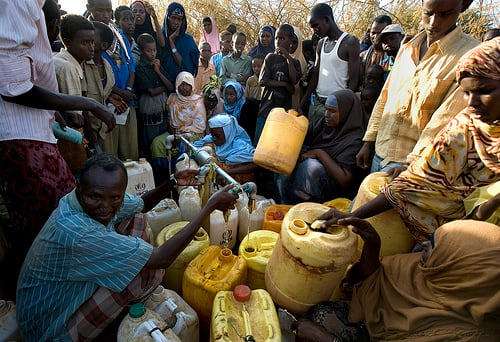
Last week the UN declared a famine in two regions of Southern Somalia and warned that it could spread to other parts of the Horn of Africa. That is a big deal. As Mark Leon Goldberg of UN Dispatch pointed out, a famine is a technical finding based or mortality, malnutrition and water consumption; they don’t happen every day. In fact, the last time a famine was declared for this region was in 1984 with the now infamous famine in Ethiopia.
Now, like then, the world is struggling to respond to this humanitarian disaster, which is taking place against the backdrop of the ongoing humanitarian disaster known as Somalia. The drought and ongoing political instability in Somalia is sending over 1,000 refugees across the border into Kenya every day. The end destination for these people is the Dadaab refugee camp complex. Originally created in 1991 to serve a mere 90,000 people, today it hosts an estimated 400,000 refugees from Somalia, Ethiopia, and Sudan across three separate camps, and is widely considered to be the largest refugee camp in the world.
Last month aid agencies warned of the growing emergency as the camp could no longer take the additional strain without the expansion that the Kenyan government has refused to allow for years. In response to the crisis, earlier this month Kenya finally gave approval to open a fourth camp located near Dadaab that will accommodate an additional 40,000 people. However, given the current overpopulation of the camp complex and the rising number of refugees, the Kenyan government has also called on the African Union and humanitarian groups to open a new camp in a third country to help lift the strain off Kenya.
The drought and resulting famine are still in the early stages but already have posed new security issues and questions on the ability of the international community to stave off disasters such as this. Over in our Ethics & Economics section, Crystal Huskey wrote detailed posts on the causes and consequences of the famine as well as how aid agencies are attempting to respond. Both are worth a read and please consider donating to one of the many agencies working in the region.
For more information, check out the following agencies:
World Food Program, http://www.wfp.org
UNICEF, http://www.unicef.org
UNHCR, http://www.unhcr.org
Action Against Hunger, https://www.actionagainsthunger.org
ActionAid, http://www.actionaid.org